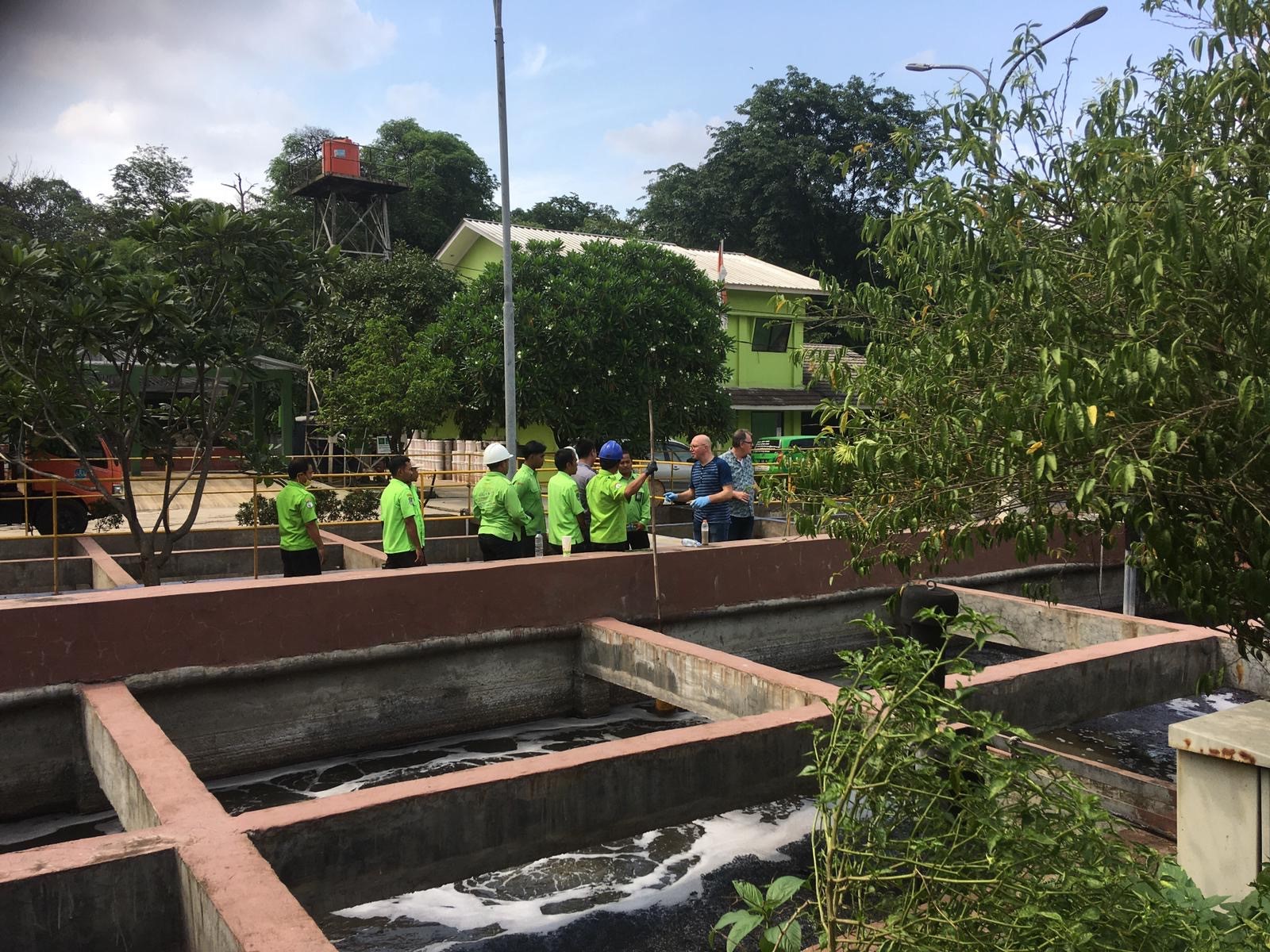Water Operators’ Partnership between Bekasi City and World Waternet to improve sanitation practices
27 November 2020Performance improvement of a treatment plant as building block for ensuring safely managed sanitation facilities for 2,5 million people.
From 2018 until 2020, World Waternet, together with Delfland Water Authority, supported the Waste Water Technical Unit of Bekasi (UPTD PALD) to improve faecal sludge management. After a lively online closing seminar in November 2020, we now look back on a successful three year Water Operators’ Partnership (WOP), funded by the Asian Development Bank’s Water Finance Program.
U kunt deze video niet bekijken omdat tracking cookies uit staan. Lees meer op de privacy- en cookiespagina.
| WOPs are peer-support partnerships between water and sanitation service providers and water authorities, carried out on a non-profit basis. Their objective is to strengthen the capacity of the receiving water organisations, enhancing their performance and enabling them to provide a better service to more people. Because of the demand driven approach and the flexible responsiveness in providing support, WOPs are often of great added value. They increasingly demonstrate their potential, because besides increasing operational performance of the local water organisation, they also improve water governance in a broader sense (e.g. revenue collection for water service, mandates for maintenance) and thus the lifespan of sustainability of any infrastructure investment. |
A successful partnership with a snowball effect
The main lesson of the partnership between Bekasi City and World Waternet is that peer-to-peer knowledge exchange on operational processes and technical performance improvements can have a snowball effect on improving all key success factors for the sustainable development of faecal sludge management. These factors are – besides performance improvement of the operator – sufficient political commitment, attraction of financial support for capital investments, a clear institutional setting, clear mandates for all stakeholders, appropriate local regulations, sufficient operator capacity on technical and financial issues, adequate revenue for operation and maintenance, and continuous awareness raising. A successful partnership with a snowball effect
The understanding of the importance of all key success factors increased and ongoing initiatives on improving these factors were brought together in the three years of the WOP, resulting in a road map for the next four years.
Sanitation challenges in Bekasi
Bekasi is a city in West Java, Indonesia, located on the eastern border of Jakarta. Bekasi has grown to become one of the centers of growth in Indonesia, accounting for more than 2% of total national GDP. The population in 2020 is about 3 million people. The majority of the population of Bekasi is not connected to the sewage network. Most of the households on Bekasi have septic tanks, soak pits or use communal based systems and public toilets. Unfortunately, most of the septic tanks do not yet meet the Indonesian national standards. The wastewater flows back into the ecosystem, polluting the groundwater and the surrounding environment. This can cause the spread of diseases with huge impacts on human health and the environment.
To increase the amount of treated waste water and to meet the Indonesian standards of 90% waste water treated in 2024, World Waternet supported UPTD PALD in improving processes at the treatment plant for faecal sludge (IPLT) and in drafting a road map for strategic improvements in the period 2020-2024.
Performance improvement of treatment plant: change the way of working
The performance improvement activities at the treatment plant were concrete, on-the-job and demand driven. A thorough assessment of the current processes of the plant was executed and, together with local staff, improvements in mechanical and electrical operation and maintenance where implemented. After several severe floods during the time of the partnership, staff was also trained in getting the plant up-and-running again after such an event. All activities had a strong train-the-trainer element, enabling staff of the plant to train both their own staff and those of other future plants in the area. The training approach also gave the staff more confidence to solve other issues themselves, an important outcome that is expected to last. Because of the COVID-19 pandemic, since March 2020 the collaboration continued online, though training videos and frequent WhatsApp contact on daily improvement issues.

Strategic planning: bringing parties together and focus on governance
At the start of the partnership between Bekasi City and World Waternet, the need for a new roadmap to improve faecal sludge management from 2020 to 2024 was expressed. Therefore, all aspects were considered in order to bring faecal sludge management to a higher level. The implemented improvements had high political commitment and support, and there was support from other international programmes. Bekasi, for example, is one of the cities targeted by the USAID IUWASH PLUS[1] (You are leaving this website) project, an initiative designed to assist the Government of Indonesia in increasing access to water supply and sanitation. At the same time, a study was performed by UNICEF to assess the feasibility of mobilizing financial domestic resources in Bekasi. Waternet was able to bring all initiatives together and support Bekasi UPTD PALD in drafting a roadmap. With the knowledge gained by working at the plant, combined with the Dutch experience in the field of water governance, Waternet was a reliable partner in the strategic discussions with Bekasi City and other international organisations. The result is a completed road map for the coming period.
In conclusion, three years of cooperation in a pragmatic, demand-driven WOP has yielded useful results. The most important success factors were a clear commitment of the staff to bring about changes in the organisation, operations and individual behavior. We greatly thank Bekasi City and in particular the UPDT PALD team for their openness and willingness to cooperate. As a WOP does not require a grand design, we strongly recommend that similar collaborations last for a longer period of time and that they will be initiated more often as part of water programmes worldwide.
[1] (You are leaving this website) Indonesia Urban Water, Sanitation and Hygiene Penyehatan Lingkungan untuk Semua